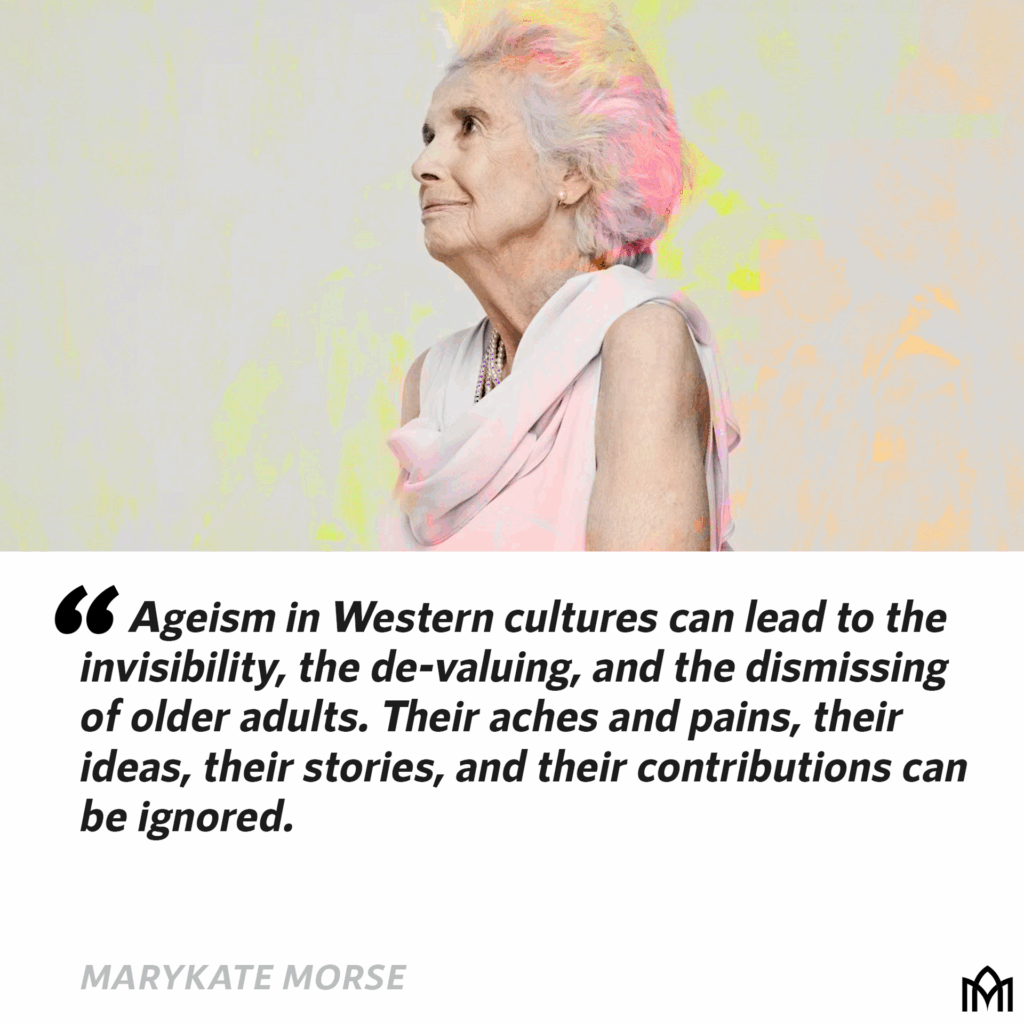How Ageism Affects Our Spiritual Formation
I just got off the phone with a representative of an investment firm. As soon as I told her my date of birth, she changed. She spoke more slowly. She became cheerier and kinder, less professional. She began talking to me as if I were a little child, who had never done anything online before. It was a little humiliating, but not her fault. In our culture we are obsessed with youthfulness, and we view the elderly as frail in mind and body.
We can’t imagine that anyone with an older face is with it enough to do anything meaningful. Some younger people wonder why the older generation doesn’t simply ride off into the sunset or sit on a beach in retirement, so that others can have their jobs. Sometimes younger people see an older face and body, especially of women, and equate the leader with antique times and tired solutions.
The entire 2024 US presidential campaign began on the back of ageism, not on policies or accomplishments. Even before President Biden dropped out, both candidates were older, and one still is. Ageism is deeply entrenched ‘stereotypes’ and ‘assumptions’ that a culture, an institution, or individual makes based on age. Dr. Robert Butler founded the National Institute on Aging, and he is credited with creating the term ‘ageism’ in 1968. In this article, I’m reflecting on the way we change how we treat adults as they get older, and how that impacts our formation.
The Impact of Ageism
I’m growing older, and as a woman leader this is particularly a difficult subject. Already women face stereotypes and assumptions about who they are and what they can do in church and leadership spaces. Add years to that woman’s face and body, and she is even less likely to have your respect. I wrote about this in Making Room for Leadership:
“It is no secret that Western culture is infatuated with youth…Americans spend billions on cosmetic surgeries, spas, face creams, and diets, trying to reverse the effects of time. In 2022, Americans spent almost $26 billion on cosmetic procedures.1Updated Statistic: American Society for Plastic Surgeons, “ASPS Breaks Down 2022 Plastic Surgery Trends,” accessed September 27, 2024, at http://www.surgery.org/press/news-release.php?iid=429. Being older in our culture is less than advantageous. It is not uncommon for the elderly to be overlooked and to go unnoticed. Toni Calasanti called it “the quest to be not old.”2Calasant, Toni, “Ageism, Gravity, and Gender,” Generations (Fall 2005), 8. When it comes to power and influence, most Westerners instinctively understand that youthfulness in appearance, or at least in attitude, is preferred. Because males are usually given more power, an older male is still given more respect than an older female. The older man is seen as having experience and wisdom, but the older woman is seen as less relevant.”3MaryKate Morse, Making Room for Leadership, (Lisle, IL: IVP, 2008), 100-101.
Ageism in Western cultures can lead to the invisibility, the de-valuing, and the dismissing of older adults. Their aches and pains, their ideas, their stories, and their contributions can be ignored. We put our retired and elderly into separate communities which take care of all their needs. No longer do they have a regular investment in the families or work places of their productive years. Now, they can simply play and relax. I can’t begin to tell you how many people ask me when I’m going to retire. People expect that you’ll ship off and be out of sight and mind. The only value of old age is to relax and try to enjoy what life you have left.
Quite the reverse is true in many Asian cultures, where older adults are treated with respect. It’s interesting that our Christian values teach us to honor our father and mother, but that can result in patronizing them, without giving them respect. By contrast, in Confucian culture, the older generations are treated with great respect, and they are honored for their wisdom and their social contributions. Unfortunately, sometimes this does lead to the abuse of younger generations by older generations. I know this system also has its downsides.
Ageism is the result of a broken world. Jesus never treated anyone with dishonor. He saw them as his beloved, who they always are, no matter their age. Jesus loves the old woman with dementia by herself in a nursing home as much as he loves the charismatic pastor of a large thriving church. He loves the old man walking his little dog as much as he loves the woman who runs a huge non-profit for the poor.
Ageism in Western cultures can lead to the invisibility, the de-valuing, and the dismissing of older adults. Their aches and pains, their ideas, their stories, and their contributions can be ignored. Share on X
Ageism Choices
I long to be engaged as a human with dignity and not as an older woman with none. So, in light of these social realities, as an aging woman leader experiencing ageism, I have 3 choices before me:
- First Choice: Hide–Keep your age a secret and keep going as long as you can. I must admit I tend to fall into this strategy. After a message or presentation, people often ask me how old I am. I don’t understand why this is important to know? What difference does it make? But it does, and I’m aware of that. I know it changes how I am perceived, so I usually answer, “I’m old enough to have grandchildren.” Normally that’s enough, but some continue with, “How old are your grandchildren?,” hoping to find a back door into discovering my age.
- Second Choice: Broadcast–Tell everyone your age, get it over with, and deal with the consequences. I have tried that on occasion. It usually backfires. Sometimes people will exclaim “No way!,” and I answer “Good genes.” I’ve had on several occasions, always women, who make a big point of taking my picture and calling their friends around. It always embarrasses me. It has nothing to do with who I am and what I feel called to do. Also, after a broadcast like this, I become more invisible as a leader in ministry.
- Third Choice: Embrace–Live this stage of life fully as an opportunity to become more like Christ. This third way is the one I try to take. I have been helped a great deal by Richard Rohr’s Falling Upward: A Spirituality for the Two Halves of Life and by Alice Fryling’s Aging Faithfully: The Holy Invitation of Growing Older. Both of these wonderful books make the central point that growing in love and skill as a follower of Christ is a mandate throughout your life. I love that Alice Fryling calls it a ‘holy invitation.’ I’m still invited to an adventure to discover my identity and to develop my relationship with Christ no matter how old I am.
At a recent spiritual retreat with my mentoring community,4We’ve been meeting annually for 15 years. We call ourselves Space4Grace. I wrote about the spiritual formation benefit of mentoring communities, especially for leaders, in Lifelong Leadership: Woven Together through Mentoring Communities (Carol Stream, IL: NavPress, 2020). I shared about feeling like I’m a little bird sitting on a fence between the unknown and a turbulent past. During the silent reflection time after my sharing, God said to me, “We have more work to do.” This deeply encouraged my soul that God wants ‘us’ to keep on until directed otherwise.
It reminded me of a recent chance encounter I had with Osteen, a Black Anglican priest from Washington D.C.. I met her in the foray of a retreat center. She was gathering her luggage to go, and Osteen began musing with me about why she had needed time at the retreat center. She came tired and very depressed. She had questions about her value at this stage of life. Osteen found herself wrestling with God about her feelings of being set aside, and not knowing what she needed to do next.
I was hanging on her every word. In an exuberant crescendo, Osteen exclaimed to me,
“You know what?! You know what?! God met me here. God turned me around. No longer am I thinking about how to complete all the things I want to do before I die. No. Instead, I’m living until I can’t!”
Her words penetrated my heart as truth. We are invited by God to live until we can’t. Each day a gift. Each day an adventure. Each day an opportunity to give back and to grow.
Growing in love and skill as a follower of Christ is a mandate throughout your life. I’m still invited to an adventure to discover my identity and to develop my relationship with Christ no matter how old I am. Share on X
A Few Words From An Older Soul
So regarding ageism, I have a few words from an older soul to the young and to the old:
To the Young
- See yourself in their face. Every older person you meet is you in the future. You are only your age for the day you’re living it. Tomorrow you will be older, and the next day older still. We are all gradually aging and slowly dying. Therefore, we are to be humble and not arrogant because of our youthfulness. Most everything you’re going to think or try has already been done.
- Be kind and respectful. Older people deserve your kindness and respect as much as any other human being you cherish. They have carried the burden of life for you, and now can be tired and worn out. Treat them with the dignity they deserve.
- Learn from them. They know things that you don’t know. They paved the road you are now walking on. Ask them questions. Ask for their thoughts and opinions. Have them tell their stories. You’ll be surprised, and you will learn things.
To the Old
- Learn and grow. Take care of yourself, and avoid the lie that your life is less meaningful and necessary as you age. Yes, the aging body is a challenge. It’s a challenge that everyone faces. Face it with dignity, and embrace the life given to you each new day. Each day the birds sing anew.
- Mentor the young. One of the greatest things we can do as older people is to mentor, befriend, and invest in the next generations coming behind us. Make friends with them. Show an interest in their lives. Lift them up whenever you can. They are eager. Give them a little push out in their boats.
- Love the Lord with a full heart. It’s easy to downshift into an automatic spiritual mode as you age. We’ve heard it all. Seen a lot. Done more. We attend church. Tithe. Volunteer. So, our hearts can get a little worn out with routine. But as Osteen said, you are not dead, so neither is the journey into the heart of God. Your priorities shift as you age. The great benefit of older years is the ability to live the dream God has for you more truly.
For All of Us
- Remember the wisdom of Osteen: “You know what?! You know what?! God met me here. God turned me around. No longer am I thinking about how to complete all the things I want to do before I die. No. Instead, I’m living until I can’t!”
///
One of the greatest things we can do as older people is to mentor, befriend, and invest in the next generations coming behind us. Make friends with them. Show an interest in their lives. Lift them up whenever you can. Share on X




